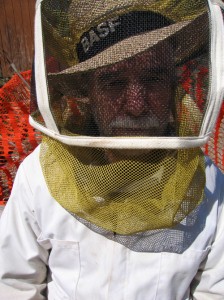Beltane Full Dyan Moon
Kate can tell when I begin to submerge, move below the surface of day to day contact. I become short, irritable. She gets the feeling of walking on egg shells. By the time this happens I’m not in touch with my effect on the outside world. Distraction and self-absorption reign.
She brings it up. We talk. Today I said, “I’ve moved into melancholy.” The distance between closed. We both know this journey and its dark side. I ate my chirashi and she her teryaki bento box.
“What precipitated it?”
“I have no idea. Chemicals, I think.”
“No. Wait. It began, I think on Hilton Head. Maybe it was the weather. I now that sounds absurd, but then, I know it happens, too. Gloomy outside, gloomy inside.”
“I love you.” Said with the grasp of both the condition and the afflicted. Therapy in their own right.
Otherwise, the day had bees and money.
Mark Nordeen came over and we popped the top on the second hive. Lotsa bees. Took a long while to get the smoker going. The smoke calms them down. They stop flying, go back into the hive.
The top hive had brood on several frames and the number of bees has tripled at least. There were three queen cups and I got to see exactly what they looked like.
“If you ever see a queen cup that has a queen in it, don’t knock it off. That means they’re about to swarm and you’ll need the second queen for those who stay behind.”
We moved the bottom hive on top because there had not been as much work done down there and we wanted to encourage more frames filled with brood.
Later in the morning we saw our cash-flow adviser. We’ve done very well and continue to do so, but as we move to retirement she says there is a big trick to moving from paid employment to retirement income. In the case of Kate we’ve been lucky to have her producing large quarterly bonuses which have enabled us to do many different things: dogs, permaculture, long trips. After retirement, those kinds of bumps in income will disappear and we have to decide how to deal with that. Turns out cash is the primary tool, having lots of it in liquid investments like CD’s, bonds or money market.
The moral here is that no matter how you feel, life goes on. Decisions have to be made. Bees need care. The garden goes through its season. There is something reassuring to the constancy and permanence of natural change.

 planted carrots and beets I didn’t water them in. Probably should have. The potatoes needed mounding and I discovered that the beets and turnips both benefit from mounding too. If a portion of these tuberous vegetables stick up above ground, they turn green and inedible.
planted carrots and beets I didn’t water them in. Probably should have. The potatoes needed mounding and I discovered that the beets and turnips both benefit from mounding too. If a portion of these tuberous vegetables stick up above ground, they turn green and inedible. Hat jauntily askew and ready to check on his bees.
Hat jauntily askew and ready to check on his bees.